FTCE Professional Final Exam Study Guide Answered 100% Correct
Document Content and Description Below
Inductive Thinking - ANSWER requires experimentation and research; moves from the concrete to the general; project-based Primary concern of educators - ANSWER Development of students' potention ... All lessons should be based on... - ANSWER Standards Lessons should start by... - ANSWER Assessing and activating prior knowledge; reviewing pre-requisite skills The type of motivation we want in students - ANSWER Intrinsic (curiosity) Optimal role of the teacher in student behavior - ANSWER Facilitate self-regulation The role of assessments - ANSWER Know if the instruction is effective and if the skills have been mastered When should we use intervention programs? - ANSWER For students who continuously fail/don't progress Effective classroom rules - ANSWER -discussed with students -posted -reviewed periodically -consistently enforced Student-centered classroom - ANSWER Mixed ability groups; cooperative learning activities The best way to increase learning - ANSWER motivation Effective teachers - ANSWER knowledgeable, reflective, monitor student performance and provide intervention Action research - ANSWER -collection of data about current education practice and resulting outcomes in order to reflect and develop an improvement plan -anecdotal records, audio, video, results of assessment Best way to prepare for a new unit - ANSWER provide clear expectations - projects and their rubrics Proximity control - ANSWER gets students back on track without being disruptive Effective directions - ANSWER Clearly provided - orally and in writing Objectives - ANSWER Should be specific and measurable -say what students should know/be able to do at the end Best way to increase student focus - ANSWER ask questions about the subject How to verify if the curriculum is lacking in certain areas - ANSWER use the gradebook Reasons for revocation of license - ANSWER -immoral acts -false information -failure to report arrest -failure to report abuse Professional development - ANSWER -should focus on improving classroom performance Software should only be used - ANSWER to teach/reinforce standards Rigor - ANSWER critical thinking, problem-solving, making predictions What should be done when students repeatedly fail on the same skill? - ANSWER Reteach and practice pre-requisite skills Creative thinking - ANSWER Produce original, creative materials Proper corrections - ANSWER Identify what is wrong and provide the correct answer When do students score higher on exams? - ANSWER When they are familiar with the test format and the content covered What is the best evidence of successful PD? - ANSWER Increase in student performance How to best teach vocabulary - ANSWER In context How to best encourage exploration of personal interests - ANSWER Choice, not creativity When are modifications necessary? - ANSWER Student below grade level and classroom accommodations aren't enough When is feedback effective? - ANSWER Specific, constructive, relevant, immediate, and sincere reciprocal teaching - ANSWER Allows the student to alternate between the role of a student and a teacher. -predicting, questioning, clarifying, summarizing criterion-referenced test - ANSWER tests for standards What should teachers do about new tools? - ANSWER Discuss with principal and share with all faculty through PD reflective learning community - ANSWER teachers meet regularly to reflect on instructional methods school improvement plans - ANSWER designed by the school advisory council and implemented by the principal and staff PD goals - ANSWER relevant, measurable, based on student needs Until when may students retest on a skill? - ANSWER Until they demonstrate mastery redirects - ANSWER used to encourage critical thinking e.g. asking if students agree or asking to expand on something the best timing for feedback - ANSWER 24-48 h after IEP annual goals - ANSWER individualized, detail what needs to be accomplished and how well (behavior - conditions- criteria) Best resource for teachers - ANSWER professional learning community/other teachers Parents should be called for... - ANSWER positive comments and academic concerns What is the impact of self-assessment of comprehension? - ANSWER Students focus on the lesson objective What type of skills does student-centered learning use? - ANSWER higher order What should teachers who teach ELL students do when they don't have the ESOL endorsement? - ANSWER -send out-of-field letter to parents -continue working on satisfying the requirement Best way to understand cultural background of students - ANSWER allow them to share personal experiences with the class stanine scores - ANSWER used in norm-referenced tests to compare student performance -single-digit number stands for percentage e.g. 7 = did as well or better than 70% of students transition management - ANSWER seamless change of activity within the lesson Where can differentiation occur? - ANSWER process (how something is delivered), products (how something is assessed), learning environments NOT the standards LEP committee meetings include - ANSWER parents, ESOL and Gen-Ed teacher, psychologist/social worker Modifications - ANSWER alternative assessments; change target skill or construct of learning (lower performance expectations - amount of content or complexity) First step for accommodations - ANSWER develop a behavior inventory personal discovery inventories - ANSWER students list characteristics about themselves (inductive) The best way to help students retain information is to - ANSWER outline objectives at the beginning and review them at the end What's an IEP? - ANSWER individualized education program/plan to support students with disabilities What is the process of an IEP? - ANSWER Identify the need, evaluate, decide eligibility, IEP meeting and writing of the IEP, provide services, measure progress, review IEP, re-evaluate child Bloom's taxonomy levels - ANSWER cognitive, affective, psychomotor What are the main guidelines for cooperative learning? - ANSWER -guided by standards -teacher is a facilitator -groups of 2-4 with defined roles and expectations -short/long term rewards to motivate -evaluate group and individual What is the best classroom arrangement for academic and social needs? - ANSWER academic - rows social - open concept In what two ways can behavior management be used? - ANSWER -prevention -intervention Ivan Pavlov's classical conditioning - ANSWER pairing neutral stimuli with unconditioned stimuli results in learning a conditioned response to a stimuli that was neutral in the past E.L. Thorndike's law of effect - ANSWER behaviors with positive consequences are more likely to be repeated and those with unfavorable consequences are not as likely to be repeated B.F. Skinner's operant conditioning - ANSWER reinforced behavior is more likely to be repeated and behavior that is not rewarded or punished is less likely to be repeated reinforcement - ANSWER - increase the likelihood of behavior to be repeated -positive ->praise, reward - negative -> removal of undesirable stimulus Premack principle - ANSWER pair undesirable behaviors with desirable acts to induce students to engage in less desirable acts (i.e. offering a reward for doing something undesirable) punishment - ANSWER -decreases the likelihood of repeat behavior -should be fair and justified by explanation extinction - ANSWER a learned behavior no longer elicits an expected reinforcement or isn't paired with an unconditioned stimulus *happens when there's failure to reinforce Bandura - ANSWER learning occurs through observation of modeled behavior and consequences of the behavior Meichenbaum's model of self-regulated learning - ANSWER practice modeled behavior by forescasting rewarding and negative consequences types of bullying victims - ANSWER -passive (no defense; just suffers) -provocative (tease and irritate bully; can't defend himself) Accommodations - ANSWER Do not reduce learning expectations or change the test construct - change presentation and how students respond What are the four categories of accommodations? - ANSWER -timing -presentation of material -setting (quiet room, small group) -response (formats) How can teachers be effective communicators? - ANSWER know audience, mini-lecture (10-20 min), variety of presentation techniques, stop and check for understanding Listservs - ANSWER compilation of all email addresses under one address (send to all) fishbone diagram - ANSWER cause-effect graphic organizer culturally responsive classroom - ANSWER -teacher recognizes the kids want to learn -strategies and behaviors used to encourage students -instructional programs prevent failure and increase opportunity seven learning styles - ANSWER -visual (spatial) -aural (auditory-musical) -verbal (linguistic) -physical (kinesthetic) -logical (mathematical) -social (interpersonal) -solitary (intrapersonal) institutional challenge - ANSWER belief that everyone can learn in the same way and use the same measure Gardner's Multiple Intelligences - ANSWER -visual-spatial -bodily-kinesthetic -musical -interpersonal -intrapersonal -linguistic -logical-mathematical Brain hemispheres - ANSWER -left --> academic and logical, language, right hand - right --> artistic, music, intuition, left hand Bloom's Cognitive Domains - ANSWER Remembering; Understanding; Applying; Analyzing; Evaluating; Creating Piaget's Cognitive Development - ANSWER 1- Sensorimotor (birth - 18/24 months) 2- Preoperational (18/24 months - 7 y/o) 3- Concrete Operational (7-12) 4- Formal Operational (adolescence to adulthood) Sensorimotor stage - ANSWER -only aware of what's in front of you -object permanence Preoperational stage - ANSWER -think symbolically -memory, imagination, language -no reliance on logical skills Concrete Operational stage - ANSWER -logical thinking -less egocentric -reversibility of actions Formal Operations - ANSWER -abstract concepts and relationships Depth of Knowledge (DOK) - ANSWER -recall and reproduction (list, identify, define) -skills and concepts (compare, contrast, classify, describe, explain, summarize, infer) -strategic thinking (analyze, explain with evidence, generalize, create) -extended thinking (synthesize, reflect, conduct, manage Jerome Bruner - ANSWER the mind is guided by experience to make predictions about the future -students should be equipped to invent things for themselves parallel thinking - ANSWER working together to address a subject rather than to argue divergent reasoning - ANSWER generate multiple answers; higher level thinking response to intervention model - ANSWER prevention system to identify students with academic skill weakness and learning disabilities What should teachers do if students do not show progress from an intervention? - ANSWER outside coaches to assist What is a curriculum-based measurement? - ANSWER An assessment that is driven directly from the curriculum being taught (would be derived from standards) What are the three areas of differentiation? - ANSWER -content -process and techniques -products (by students) What are the different types of academic intervention? - ANSWER -acquisition -proficiency/accuracy -proficiency/speed -generalization -motivation Acquisition techniques - ANSWER Is the task too difficult for the student? e.g. guided reading, peer-assisted activities, tutoring Proficiency/Accuracy techniques - ANSWER Does the student need more support? e.g. cover/copy/compare, response cards Proficiency/Speed techniques - ANSWER Does the student struggle with time? e.g. repeated readings, partner reading, peer-assisted Generalization techniques - ANSWER Has the student successfully done the task before? e.g. functional mediators, train diversely Motivation techniques - ANSWER Does the student lack motivation? e.g. drill practices, mystery Literacy - ANSWER ability to read, write, speak, listen, and think effectively - enables learning and communication What are the three cognitive components of content literacy? - ANSWER -general literacy skills -content-specific literacy skills -prior knowledge of content achievement test - ANSWER standardized test to measure knowledge/skills alternative assessment - ANSWER may require students to answer open-ended questions, solve a problem, demonstrate a skill, produce work authentic assessment - ANSWER measures a behavior in "real world" context; practice an entire concept constructive-response question - ANSWER create something rather than choose from a list to answer the question criterion-referenced test - ANSWER level of mastery holistic method - ANSWER assign a single score; evaluates product, not process outcome - ANSWER usually a culminating activity, product or performance that can be measured performance-based assessment - ANSWER ability to apply knowledge in real-life setting; rubric or analytic scoring guide to guide with objectivity running record - ANSWER used to assess reading level as a student reads from a benchmark book or selection What are the most common alternative assessment techniques? - ANSWER portfolios and projects What are the components of a cognitive objective? - ANSWER Condition, behavior, degree school advisory council (SAC) - ANSWER -reflective of the community (includes principal) -voting members -must meet when members can attend and send agenda two weeks prior to meeting -keep minutes -responsible for school improvement plan and its evaluation, approve budget elections for SAC - ANSWER nominations are invited by the principal; names and ethnic/racial info of winners is sent to the school board -vacancies during the year may be appointed members -elected in an equitable manner What must be the composition of a SAC? - ANSWER 51% + community members not employed by the district; reflection of community diversity standards for professional development - ANSWER -individual needs assessment ---> IPDP includes measurable goals for student achievements, changes in practices and evaluation plan - IPDP reviewed by administration - sustained PD -apply what was learned while receiving support (coaching and resources) -evaluation of plan implementation and changes in practice and student performance ***a similar process is done once a year by schools through classroom-by-classroom analysis to develop a school-wide PDP ***at the district level, they must create opportunities for PD and evaluate their efficacy Sections in the Code of Ethics - ANSWER 3 Obligations to the student - ANSWER -protect from harm -pursuit of learning, diverse POV, accurate presentation of subject -no embarrassment -no violation of legal rights -no discrimination or exploitation for personal gain/advantage -keep identifiable info in confidence Obligations to the public - ANSWER -distinguish between personal views and those of the organization -no use of institutional privileges for gain/advantage -no gift that can influence judgement - no gift to obtain advantages Obligations to the profession - ANSWER -honesty -colleagues (do not deny participation, no harassment, discrimination, interfere with civil and political rights and responsibilities, no false or malicious comments -no fraud or misrepresentation of qualifications -self-report -report violations ***No obligations to the district Who investigates allegations of misconduct? - ANSWER Office of Professional Practice Services LY vs LF - ANSWER LY - code while in ESOL class LF - two year follow-up period after exiting ESOL No Child Left Behind - ANSWER -no testing in languages other than English -districts are responsible for programs to teach English -accommodations for ELLs Florida Consent Decree - ANSWER civil rights of ELL including identification, assessment, evaluation Identification and Assessment of ELLs - ANSWER -Home Language Survey --> test within 20 days -If LEP, notify in writing and enroll in ESOL program *can be appealed by parents Funding for ESOL in FL - ANSWER 5 years + 1 year if the student exists and reenters program Teacher training for ELLs - ANSWER -15 semester hours Alternatively: reduced # of credits or in-service hours + FTCE ESOL exam Who monitors compliance with Florida Consent Decree? - ANSWER FLDOE Stage sof language acquisition - ANSWER -Pre-production (silent period, non-verbal response) -Early production (short answers, approx. 6 months) -Speech Emergent (simple questions and sentences, conversation, classwork with assistance, simple texts) -Intermediate Fluency (complex sentences, writing with errors, may seem fluent in social communication, high-order thinking) [Show More]
Last updated: 1 year ago
Preview 1 out of 21 pages
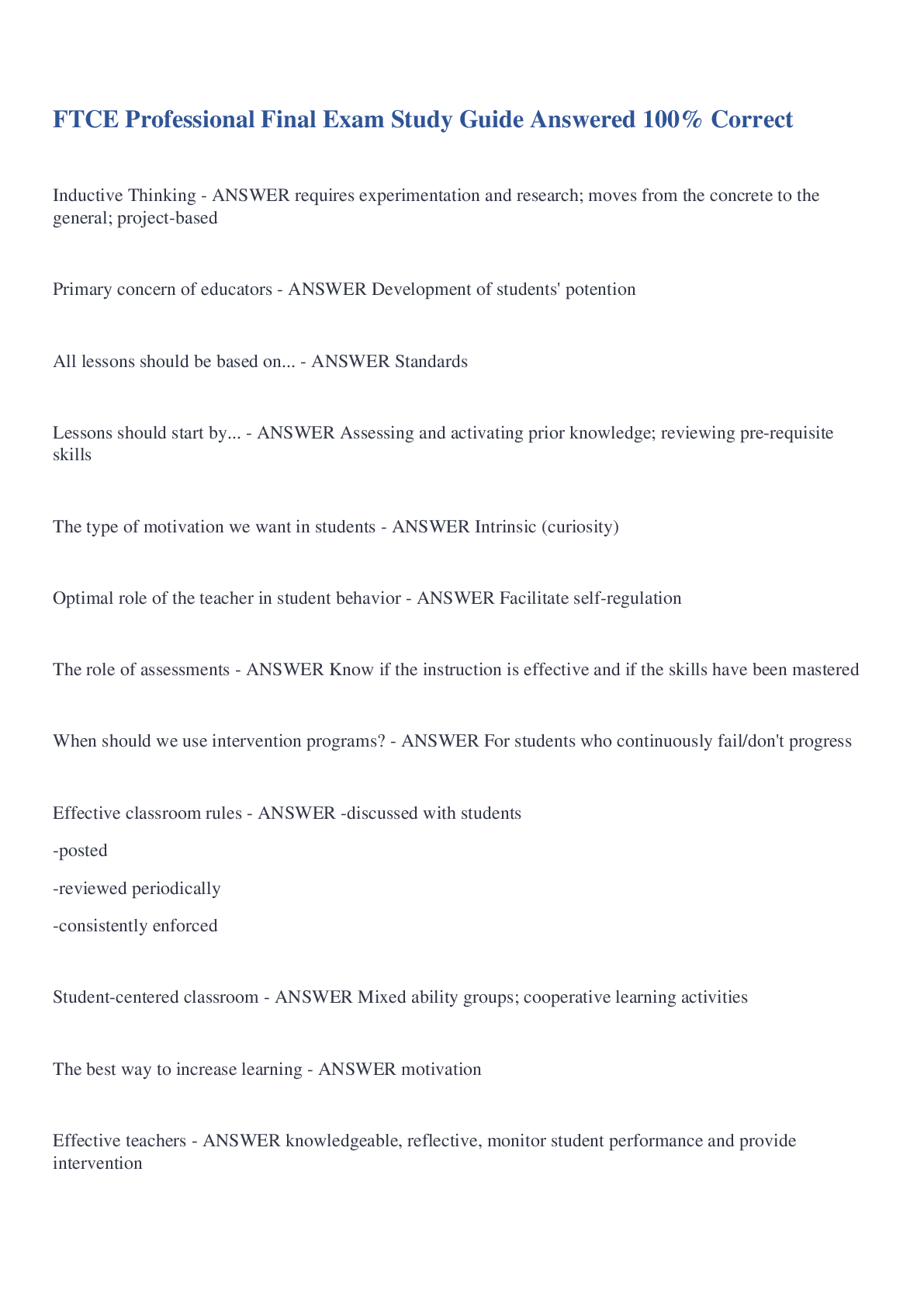
Reviews( 0 )
Recommended For You
*NURSING> EXAM > NUR 2790 / NUR2790 Professional Nursing III / PN3 Final Exam Study Guide Questions and Answers . Rasmussen College (All)
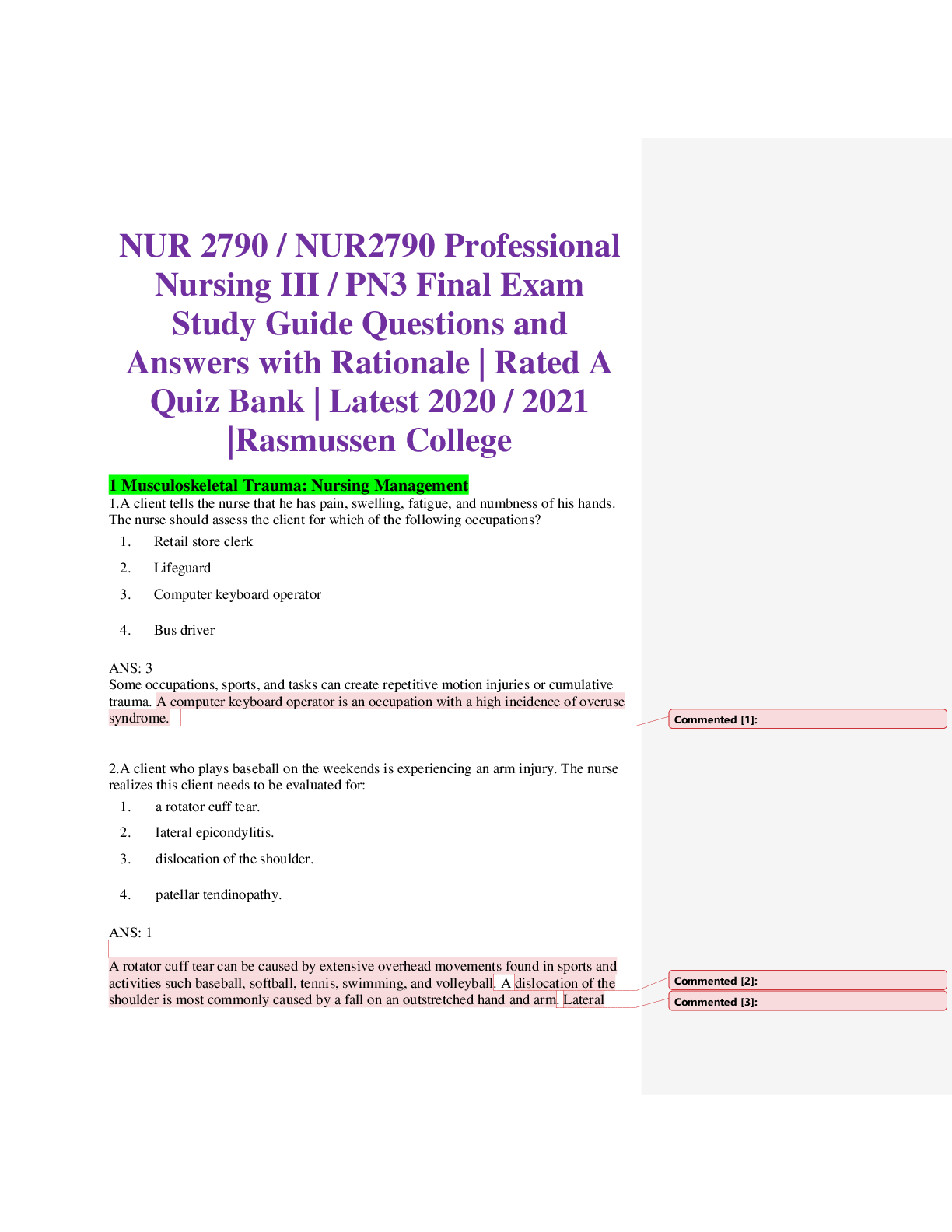
NUR 2790 / NUR2790 Professional Nursing III / PN3 Final Exam Study Guide Questions and Answers . Rasmussen College
NUR 2790 / NUR2790 Professional Nursing III / PN3 Final Exam Study Guide Questions and Answers with Rationale | Rated A Quiz Bank | Latest 2020 / 2021 |Rasmussen College 1 Musculoskeletal Trauma: N...
By nurse_steph , Uploaded: Dec 10, 2020
$12
Health Care> EXAM > NR 599 Week 8 Final Exam study Guide/ NR 599 Week 8 Final Exam study Guide (All)
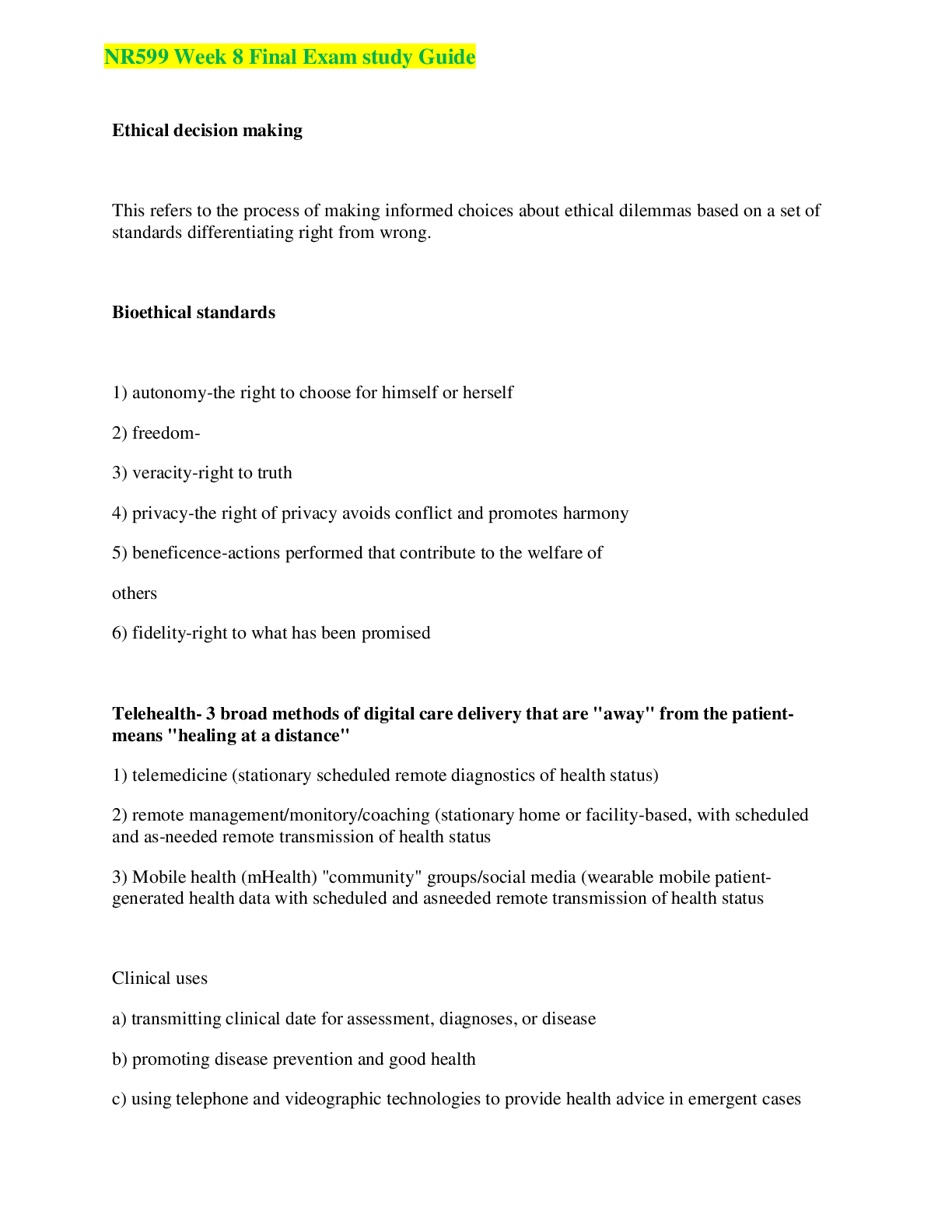
NR 599 Week 8 Final Exam study Guide/ NR 599 Week 8 Final Exam study Guide
NR599 Week 8 Final Exam study Guide
By QUIZBANK , Uploaded: Feb 21, 2021
$8
*NURSING> EXAM > NR566 Advanced Pharmacology for Care of the Family. Final Exam study guide (All)
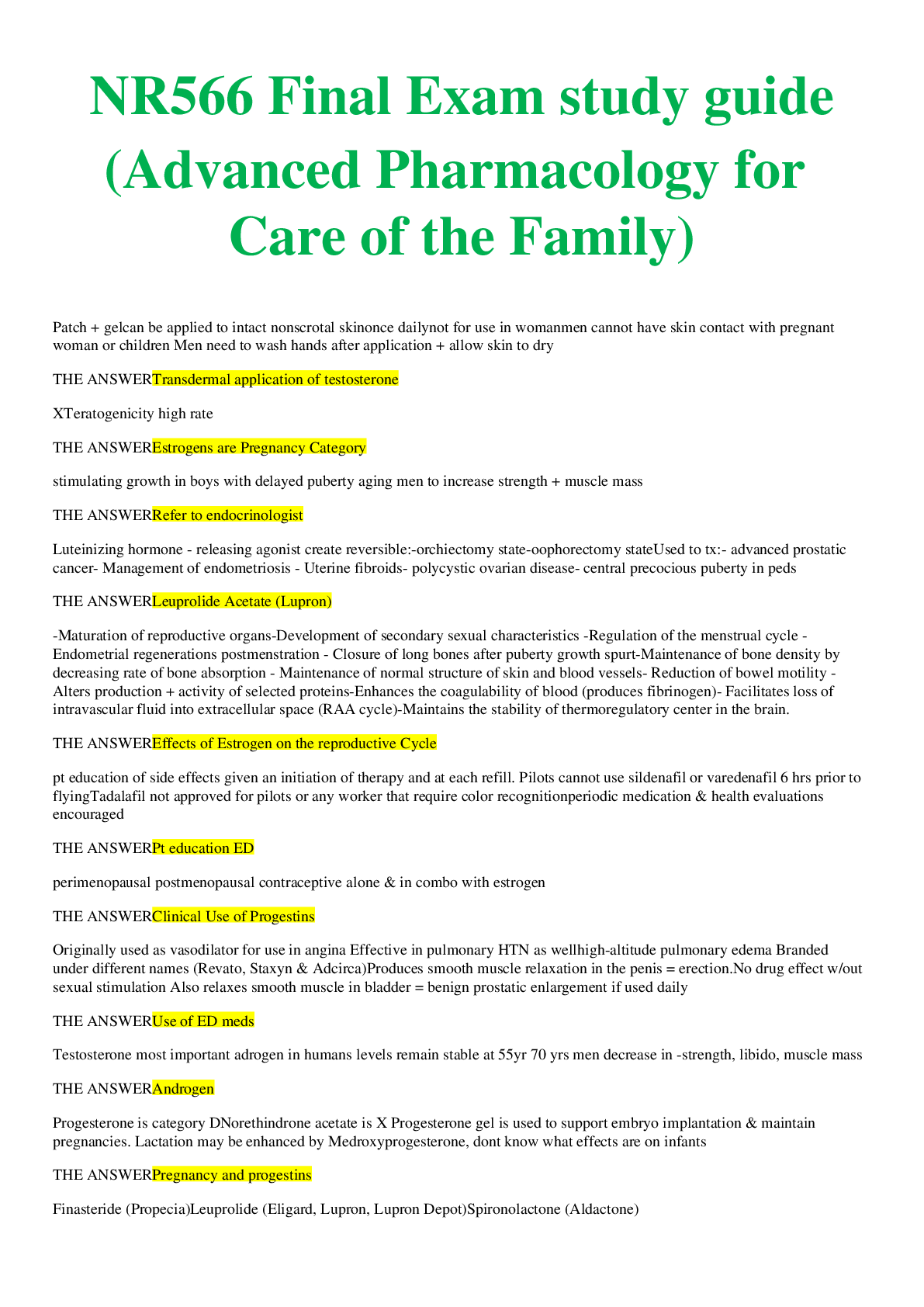
NR566 Advanced Pharmacology for Care of the Family. Final Exam study guide
NR566 Final Exam study guide (Advanced Pharmacology for Care of the Family) 1. Patch + gel can be applied to intact nonscrotal skin once daily not for use in woman men cannot have skin contact...
By A GRADE , Uploaded: Dec 18, 2020
$12
*NURSING> EXAM > NR565 / NR 565 Advanced Pharmacology Fundamentals Final Exam Study Guide | Rated A (All)
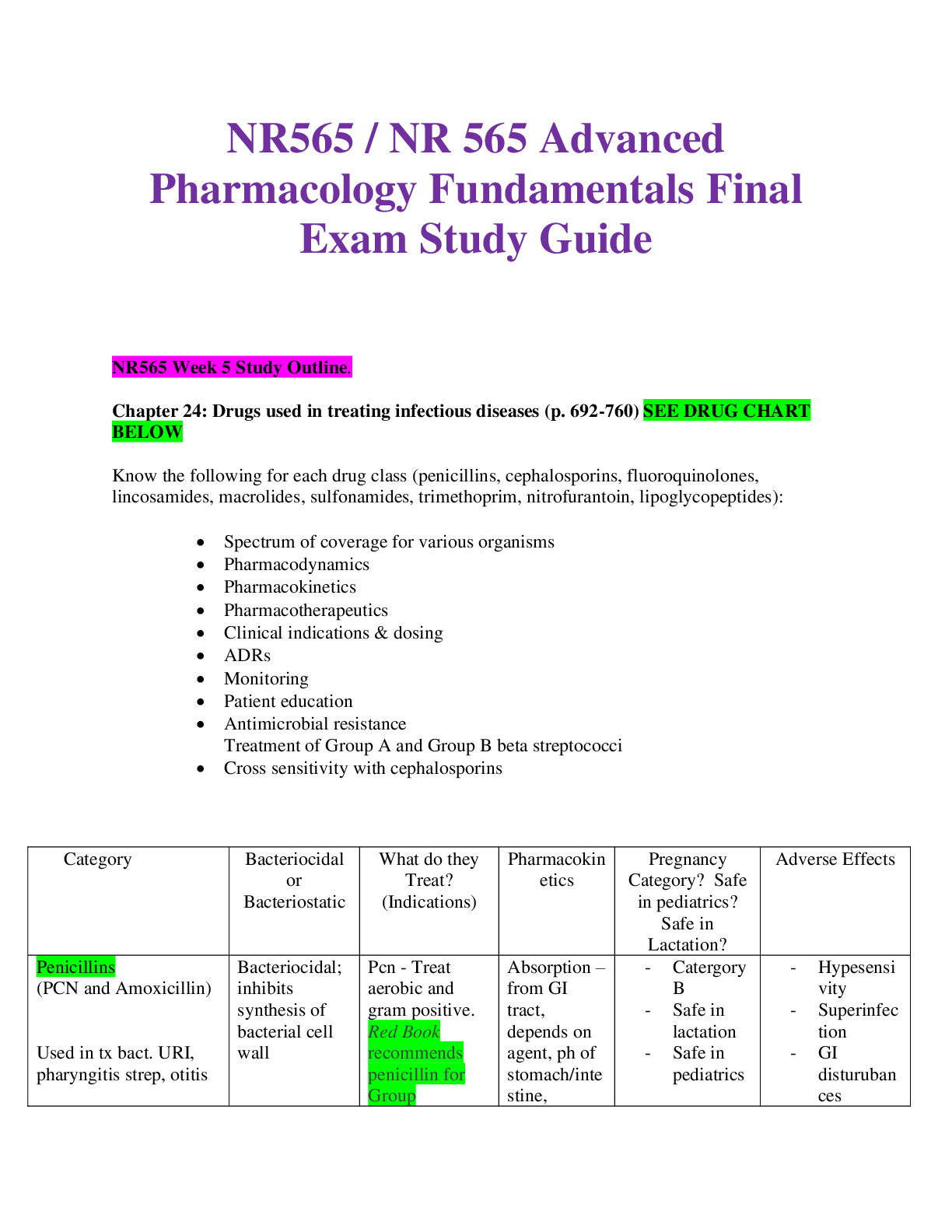
NR565 / NR 565 Advanced Pharmacology Fundamentals Final Exam Study Guide | Rated A
NR565 / NR 565 Advanced Pharmacology Fundamentals Final Exam Study Guide | Rated A | Latest 2020 / 2021 NR565 Week 5 Study Outline. Chapter 24: Drugs used in treating infectious diseases (p. 692-760)...
By nurse_steph , Uploaded: Dec 10, 2020
$13
*NURSING> EXAM > NUR 2063 / NUR2063 Essentials of Pathophysiology Final Exam Study Guide| Modules 1-10 | Highly Rated | Latest, 2020 / 2021 | Rasmussen College (All)
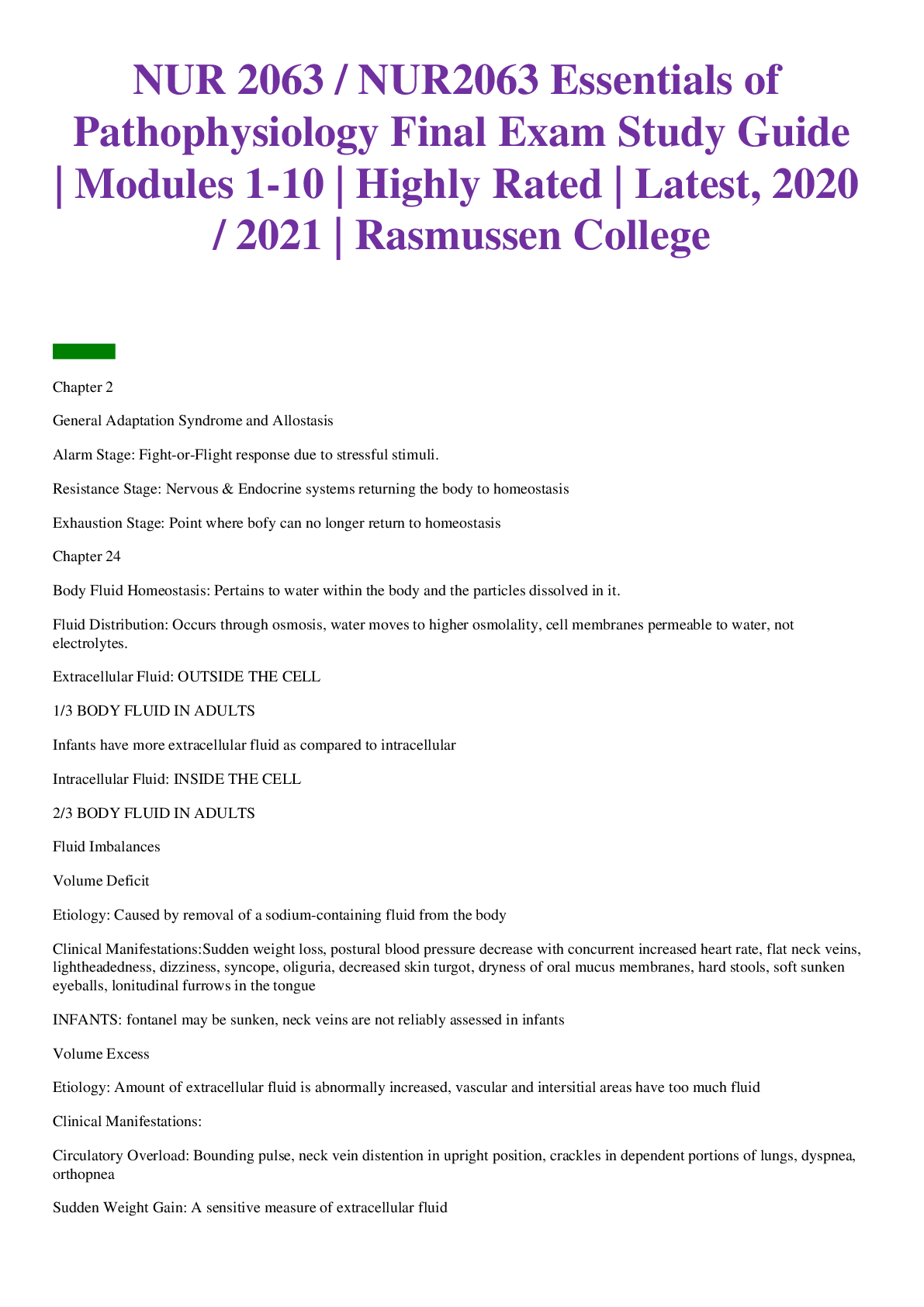
NUR 2063 / NUR2063 Essentials of Pathophysiology Final Exam Study Guide| Modules 1-10 | Highly Rated | Latest, 2020 / 2021 | Rasmussen College
NUR 2063 / NUR2063 Essentials of Pathophysiology Final Exam Study Guide| Modules 1-10 | Highly Rated | Latest, 2020 / 2021 | Rasmussen College Module 1 Chapter 2 I. General Adaptation Syndrome...
By nurse_steph , Uploaded: Dec 11, 2020
$13
*NURSING> EXAM > NR 509 / NR509 Advanced Physical Assessment Final Exam Study Guide | Highly Rated Complete Guide| Latest | Chamberlain College (All)
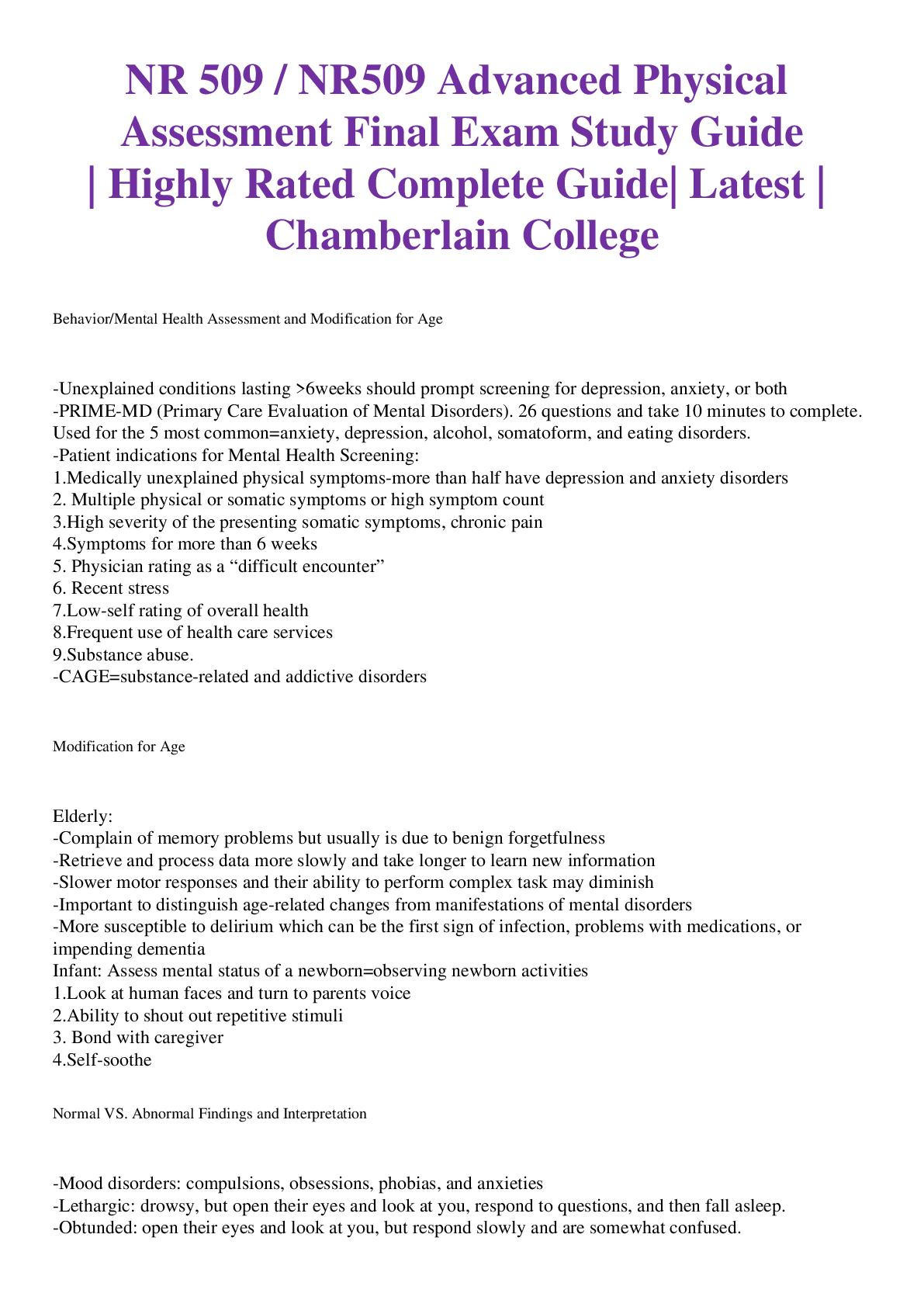
NR 509 / NR509 Advanced Physical Assessment Final Exam Study Guide | Highly Rated Complete Guide| Latest | Chamberlain College
NR 509 / NR509 Advanced Physical Assessment Final Exam Study Guide | Highly Rated Complete Guide| Latest | Chamberlain College Behavior/Mental Health Assessment and Modification for Age -Unexp...
By nurse_steph , Uploaded: Dec 17, 2020
$15
*NURSING> EXAM > NR 599 / NR599 Nursing Informatics for Advanced Practice Final Exam Study Guide | Week 5 -8 | Latest 2020 / 2021 | Chamberlain College (All)

NR 599 / NR599 Nursing Informatics for Advanced Practice Final Exam Study Guide | Week 5 -8 | Latest 2020 / 2021 | Chamberlain College
NR 599 / NR599 Nursing Informatics for Advanced Practice Final Exam Study Guide | Week 5 -8 | Latest 2020 / 2021 | Chamberlain College Ethical decision making ○ When making choices about ethic...
By nurse_steph , Uploaded: Dec 19, 2020
$13
*NURSING> EXAM > NUR2474 / NUR 2474 Pharmacology for Professional Nursing Final Exam Study Guide | Rated A | Latest 2020 / 2021 | Rasmussen College (All)
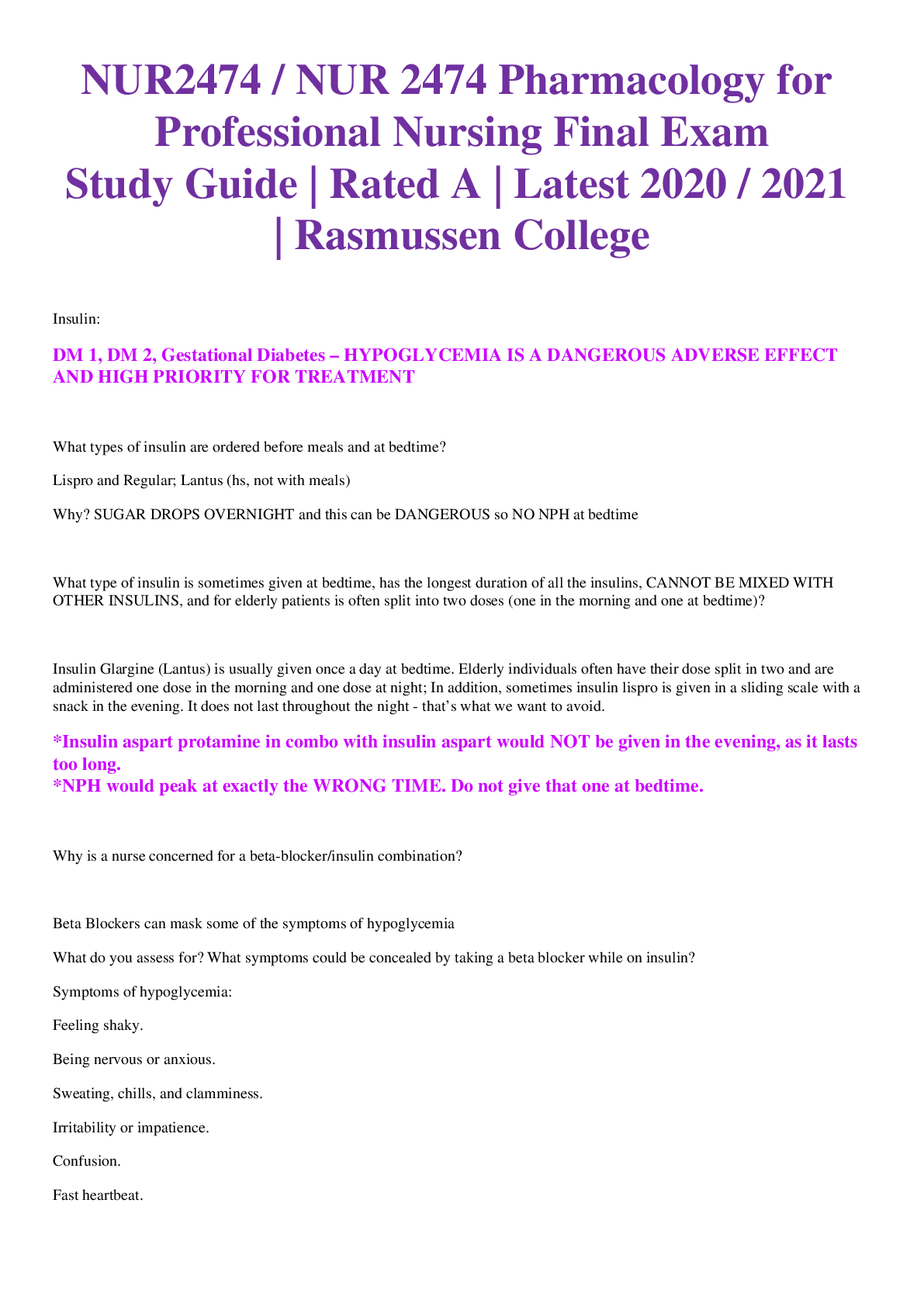
NUR2474 / NUR 2474 Pharmacology for Professional Nursing Final Exam Study Guide | Rated A | Latest 2020 / 2021 | Rasmussen College
NUR2474 / NUR 2474 Pharmacology for Professional Nursing Final Exam Study Guide | Rated A | Latest 2020 / 2021 | Rasmussen College 1. Insulin: DM 1, DM 2, Gestational Diabetes – HYPOGLYCEMIA IS A...
By nurse_steph , Uploaded: Dec 22, 2020
$11
*NURSING> EXAM > NR 503 Week 8 Final Exam Study Guide; Chapter 2-4, 5-6, 7-8, 9-15, 16-20 (All)
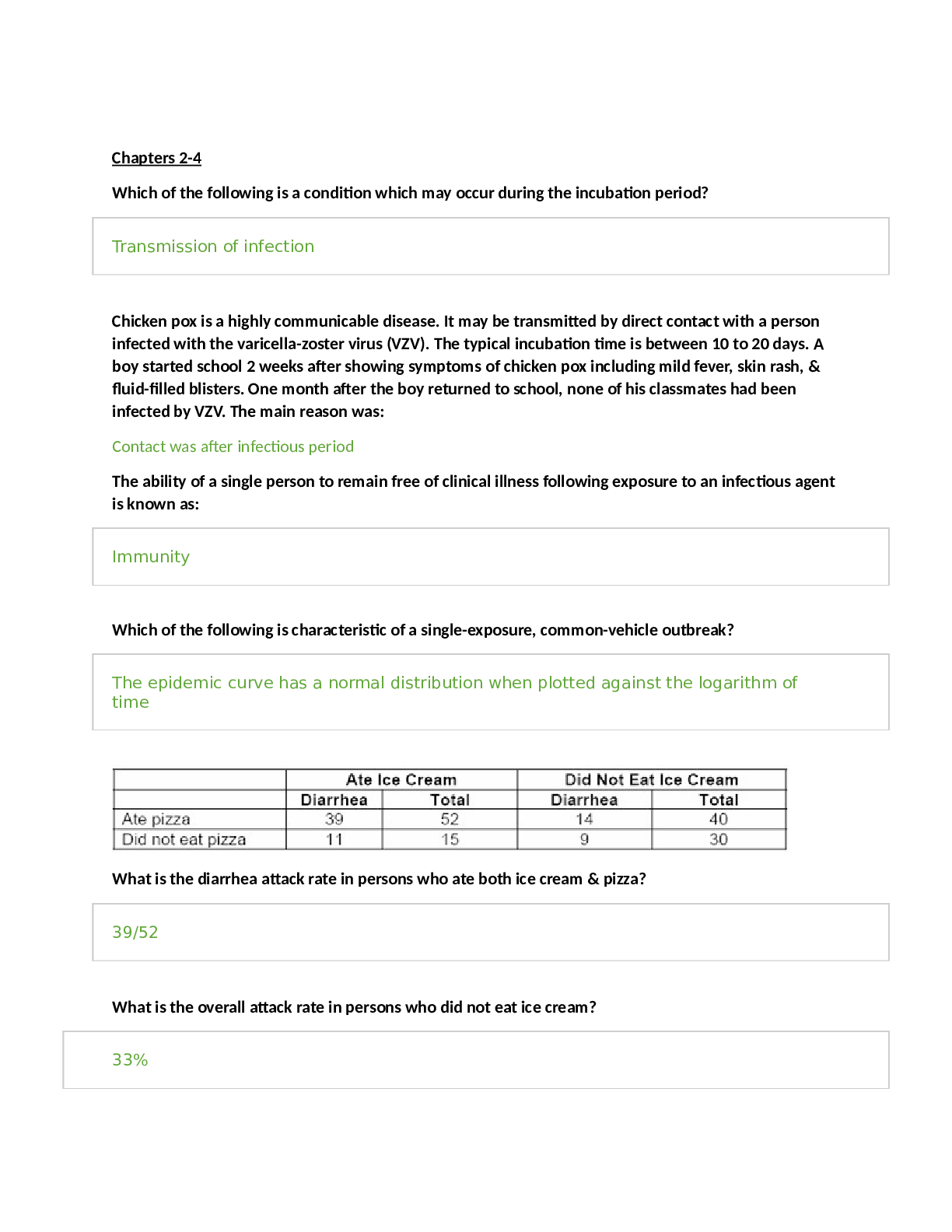
NR 503 Week 8 Final Exam Study Guide; Chapter 2-4, 5-6, 7-8, 9-15, 16-20
Chapters 2-4 Which of the following is a condition which may occur during the incubation period? Chicken pox is a highly communicable disease. It may be transmitted by direct contact with a person i...
By Studyrepository , Uploaded: Feb 01, 2022
$18
Health Care> EXAM > AORN Periop 101 Final Exam Study Guide 2023 (All)
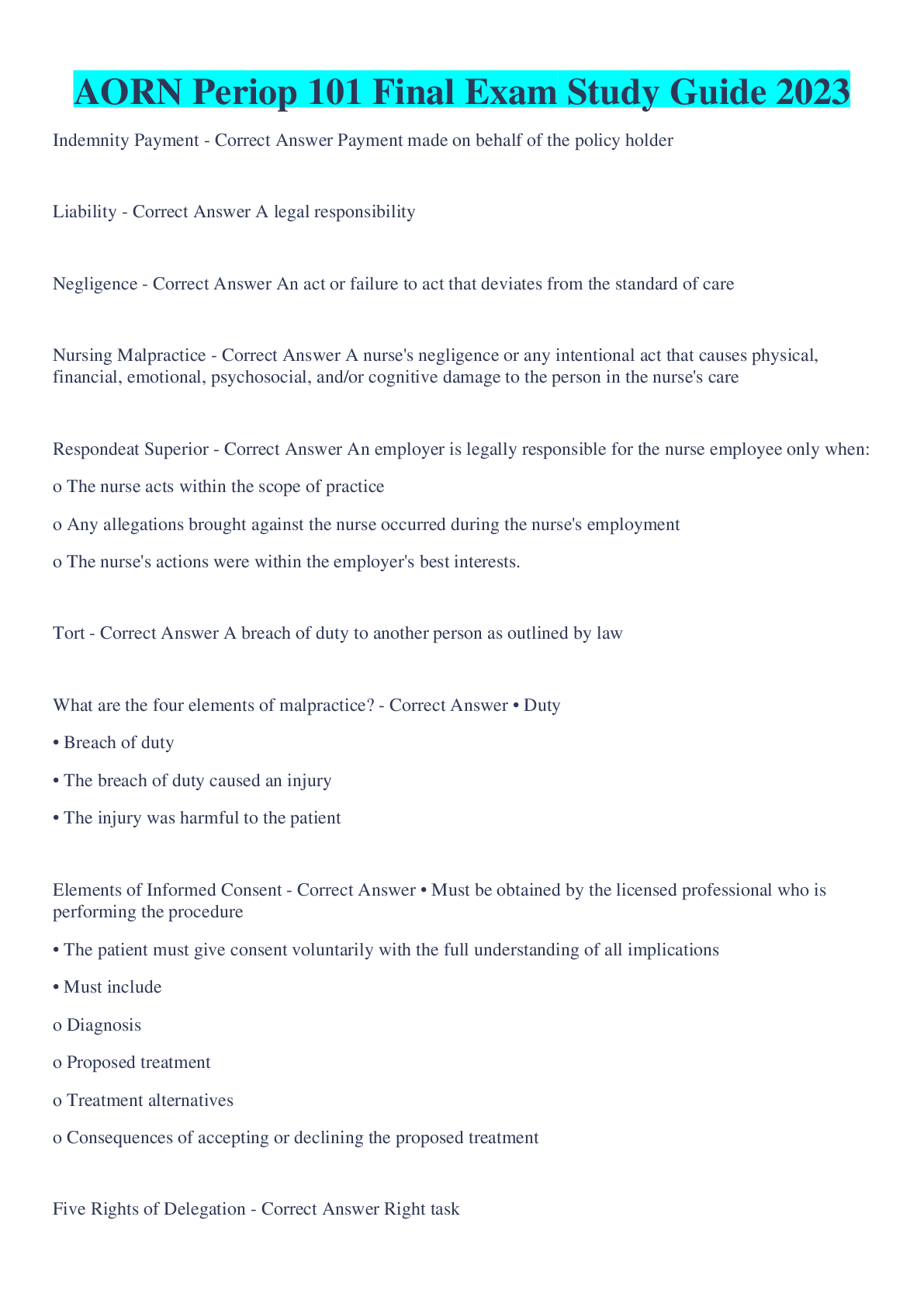
AORN Periop 101 Final Exam Study Guide 2023
Indemnity Payment - Correct Answer Payment made on behalf of the policy holder Liability - Correct Answer A legal responsibility Negligence - Correct Answer An act or failure to act that deviate...
By Winfred , Uploaded: Jun 30, 2023
$9
Document information
Connected school, study & course
About the document
Uploaded On
Nov 21, 2022
Number of pages
21
Written in
Additional information
This document has been written for:
Uploaded
Nov 21, 2022
Downloads
0
Views
36






